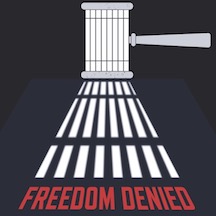 A new report from the Federal Criminal Justice Clinic at the University of Chicago Law School finds a bias in federal pretrial detention that negatively impacts people of color.
A new report from the Federal Criminal Justice Clinic at the University of Chicago Law School finds a bias in federal pretrial detention that negatively impacts people of color.
Since the enactment of the Bail Reform Act of 1984, the pretrial incarceration rates of those charged with federal offenses skyrocketed from 29 percent to 75 percent with the impact falling most heavily on people of color, those from low-income backgrounds, and non-citizens, according to the report. In 37 percent of cases, judges imposed monetary bail conditions, including bail bonds, and over one third of those people remained in jail because they were too poor to make bail. Black and Latino people were much more likely to face financial burdens than White people; 95 percent of those judges saddled with money bail were people of color. In addition to the human cost of pretrial detention, taxpayers spend an estimated $1 billion per year to keep those without convictions behind bars.
“In our legal system, everyone who enters the courtroom is presumed innocent and is entitled to certain legal rights and protections. But in federal courtrooms across the country, judges are ignoring the presumption of innocence and violating people’s rights, and marginalized communities are paying the price,” said Alison Siegler, founding director of the Federal Criminal Justice Clinic and Clinical Professor of Law at the University of Chicago Law School.
“An important role of the judiciary is to ensure that the law is fairly and impartially applied to each person entering the courtroom. Failure to do so can undermine the integrity of our legal system,” added Jonathan E. Hawley, United States Magistrate Judge for the Central District of Illinois and chair of the Magistrate Judge Education Advisory Committee of the Federal Judicial Center.
The full report, Freedom Denied: How the Culture of Detention Created a Federal Jailing Crisis, may be downloaded here.











